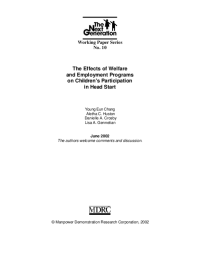The Effects of Welfare and Employment Programs on Children's Participation in Head Start
Summary of Key Findings from Working Paper No. 10
Background
Since its inception, Head Start has served children from low-income families with the goal of improving school readiness, social skills, and health. Families whose children are the intended participants in Head Start have also been the targets of major changes in welfare policy over the past several years, making interactions between Head Start and welfare reform initiatives affecting parents an important research question. By increasing parental employment, do welfare reform policies lead to higher demand for child care services, generally, and for Head Start programs, specifically, as a potentially free, educationally enriching source of center-based care. Or might the timing and scheduling of employment make participation in Head Start programs more difficult. This working paper uses data from four random assignment studies that tested 10 welfare and employment pilot programs to examine the impact of welfare reform policies on Head Start participation.
Key Findings
Welfare and employment programs increased parental employment and use of both center-based and home-based child care among preschool-aged children. However, the programs did not affect preschool-aged children's participation in Head Start.
The structure and eligibility requirements of Head Start appear to present barriers to mothers who are also trying to meet the demands of welfare reform and reap the benefits of employment.
Conclusions and Implications
The findings suggest that policymakers consider making the Head Start program more congruent with the needs of families moving from welfare to work. Recent efforts to expand Head Start to a full-day, full-year program may enable more low-income families achieve economic self-sufficiency and have their children benefit from the program's educational enrichment. And further efforts to extend Head Start eligibility to households with incomes that rise above the poverty line may permit more low-income families to place their children in Head Start as they transition out of welfare.






